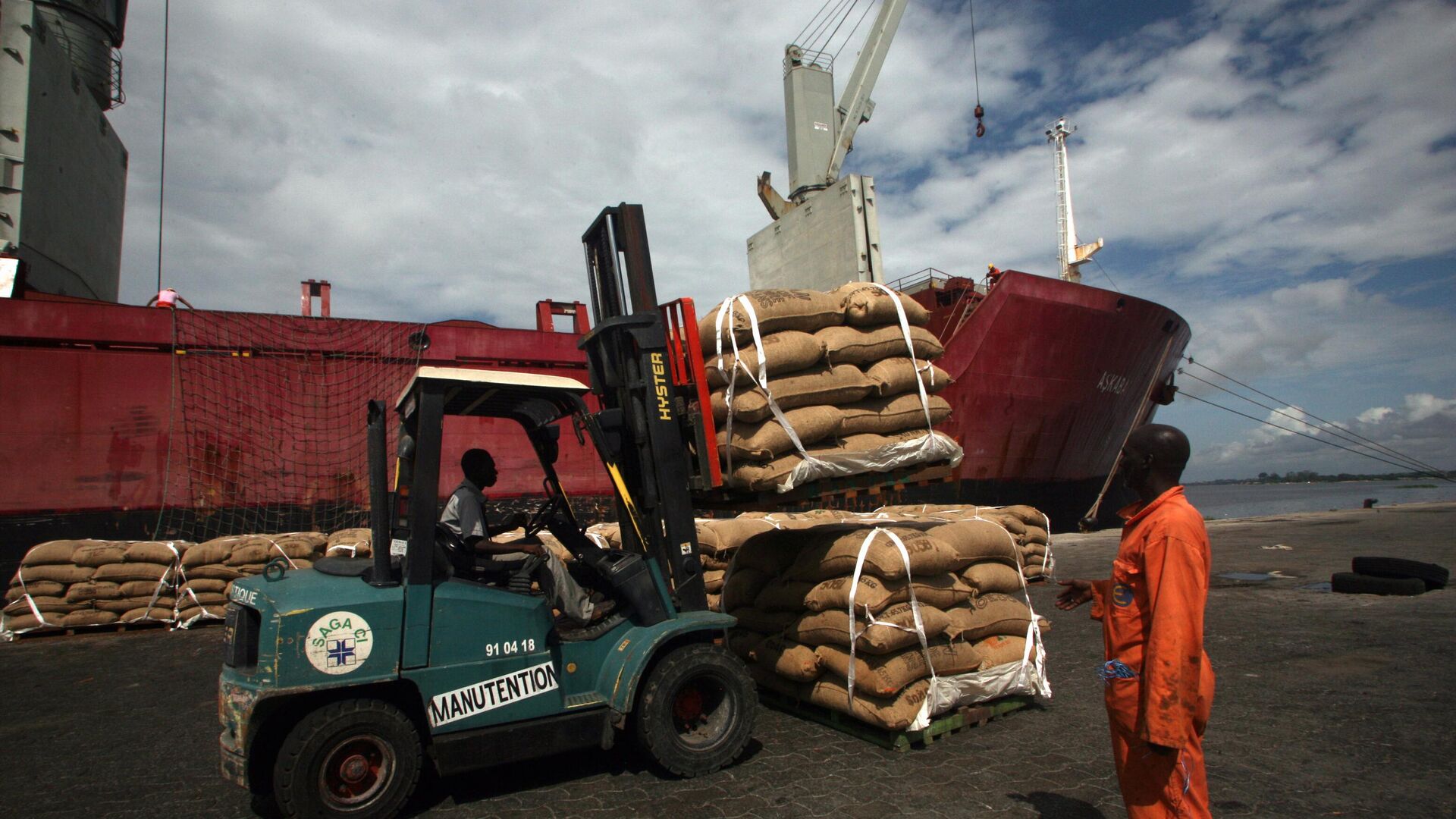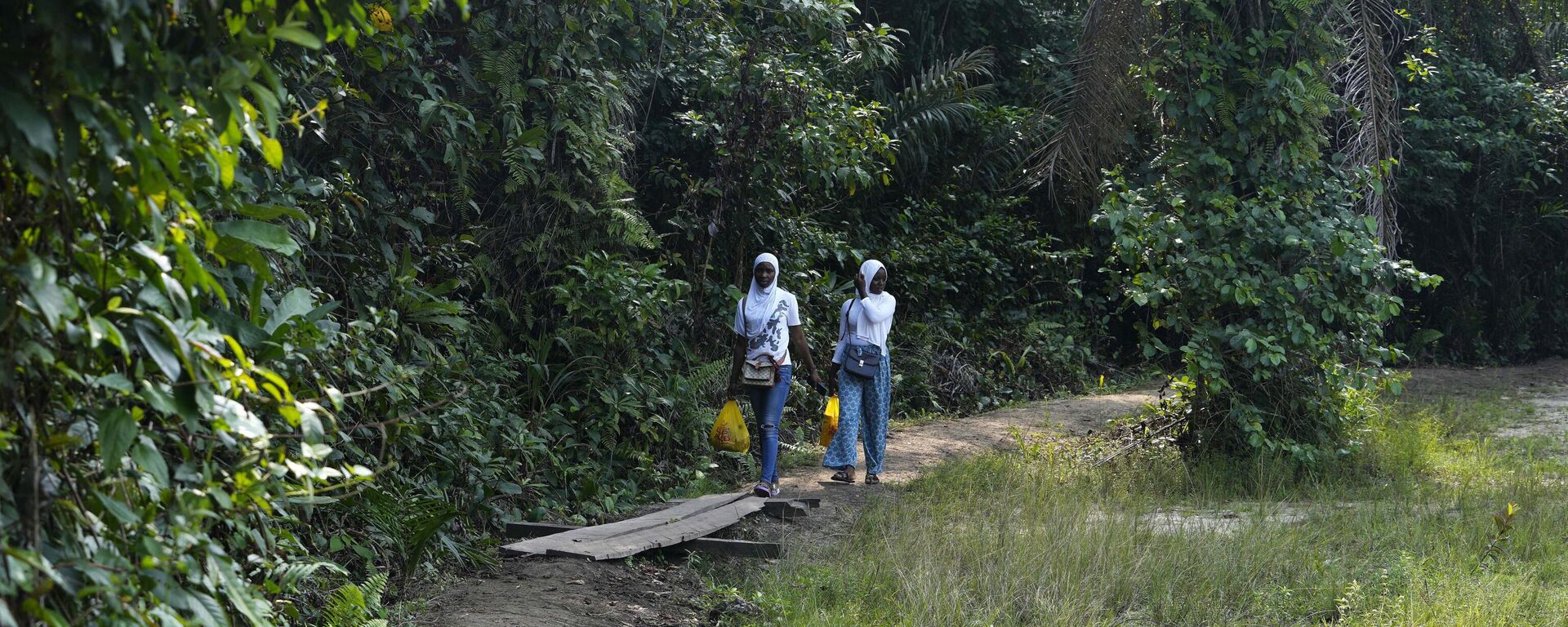https://sputnikglobe.com/20230411/eu-cocoa-imports-associated-with-deforestation-in-ivory-coast-study-finds-1109350381.html
EU Cocoa Imports Associated With Deforestation in Ivory Coast, Study Finds
EU Cocoa Imports Associated With Deforestation in Ivory Coast, Study Finds
Sputnik International
A recent study conducted by researchers from Belgium has revealed that unregulated cocoa production in Cote d'Ivoire is responsible for 45% of the deforestation in the West African country between 2000 and 2019.
2023-04-11T18:16+0000
2023-04-11T18:16+0000
2023-04-11T18:16+0000
africa
west africa
cote d'ivoire
deforestation
forest
new study
belgium
chocolate production
chocolate
climate change
https://cdn1.img.sputnikglobe.com/img/07e7/04/0b/1109352699_0:34:3106:1781_1920x0_80_0_0_ec9fef3c0525012ef900daaa53619e48.jpg
A recent study conducted by researchers from the University of Louvain in Belgium has revealed that unregulated cocoa production in the Ivory Coast was responsible for 45% of the deforestation in the West African country between 2000 and 2019.The destruction of tropical forest covering 2.5 million hectares for cocoa plantations, the main ingredient in chocolate, has been identified as a major concern, particularly as the Ivory Coast is the world's largest producer of cocoa. The report cites untraced sourcing as being responsible for 60% of the deforestation.According to the Belgian scholars, the regulations of the European Union, a major importer of Ivorian cocoa, require that all imported products to the economic bloc are traceable back to the original producer. The study identified 838,000 hectares of deforestation associated with EU imports, with 56% of this arising through untraced sourcing.The research paper, titled Transparency, Traceability and Deforestation in the Ivorian Cocoa Supply Chain, noted that in 2019, EU countries imported 60% of Ivorian cocoa beans, but only 44% of cocoa exports from Ivory Coast could be traced back to a specific producer.The researchers suggest that the Cocoa and Forests Initiative (CFI) implemented by the government of the Ivory Coast, along with other major cocoa producers, Ghana and Colombia, is not working. The initiative was launched in 2017 by now King Charles III with the commitment of 35 chocolate and cocoa companies to work together to battle deforestation and forest degradation in the cocoa-producing countries.In order to slow down deforestation, the researchers recommend strongly enforced land-use policies and full farm-level traceability in the Ivory Coast, as well as requiring giant chocolate producers in Europe to prove that their products have not contributed to deforestation in the origin countries in Africa.Cocoa production plays a crucial role in the Ivorian economy, contributing significantly to the country's GDP and providing employment for millions of people. Followed by neighboring Ghana, the Ivory Coast is the world's largest producer of cocoa, with over one million small farmers producing over two million tons of cocoa beans each year. Cocoa accounts for about 40% of the West African country's export earnings, making it a vital source of foreign exchange.
https://sputnikglobe.com/20230321/tanzanian-ecoactivist-enough-is-enough-with-wests-african-forest-exploitation-1108652803.html
africa
west africa
cote d'ivoire
belgium
Sputnik International
feedback@sputniknews.com
+74956456601
MIA „Rossiya Segodnya“
2023
Muhammad Nooh Osman
https://cdn1.img.sputnikglobe.com/img/07e4/08/0e/1080170965_2:0:2050:2048_100x100_80_0_0_1de8233c87df0979e7e74f61b6ffacad.jpg
Muhammad Nooh Osman
https://cdn1.img.sputnikglobe.com/img/07e4/08/0e/1080170965_2:0:2050:2048_100x100_80_0_0_1de8233c87df0979e7e74f61b6ffacad.jpg
News
en_EN
Sputnik International
feedback@sputniknews.com
+74956456601
MIA „Rossiya Segodnya“
Sputnik International
feedback@sputniknews.com
+74956456601
MIA „Rossiya Segodnya“
Muhammad Nooh Osman
https://cdn1.img.sputnikglobe.com/img/07e4/08/0e/1080170965_2:0:2050:2048_100x100_80_0_0_1de8233c87df0979e7e74f61b6ffacad.jpg
eu cocoa imports, cocoa imports, cocoa exports, cote d'ivoire, eu, european union, cote d'ivoire cocoa, cocoa production, unregulated cocoa production, chocolate production, deforestation, deforestation in africa, deforestation in cote d'ivoire,
eu cocoa imports, cocoa imports, cocoa exports, cote d'ivoire, eu, european union, cote d'ivoire cocoa, cocoa production, unregulated cocoa production, chocolate production, deforestation, deforestation in africa, deforestation in cote d'ivoire,
EU Cocoa Imports Associated With Deforestation in Ivory Coast, Study Finds
Muhammad Nooh Osman
Writer/Editor
The Ivory Coast is the world's leading producer of cocoa. A previous study carried out during the period between 2019 and 2021 by the Ivorian Ministry of Waters and Forests revealed that the country had lost about 80% of its forest cover over the past six decades.
A recent study conducted by researchers from the University of Louvain in Belgium has revealed that unregulated cocoa production in the Ivory Coast was responsible for 45% of the deforestation in the West African country between 2000 and 2019.
The destruction of tropical forest covering 2.5 million hectares for cocoa plantations, the main ingredient in chocolate, has been identified as a major concern, particularly as the Ivory Coast is the world's largest producer of cocoa. The report cites untraced sourcing as being responsible for 60% of the deforestation.
"Our results also demonstrate the role of cocoa as a major driver of deforestation in Cote d’Ivoire, with almost half of the undisturbed tropical moist forest lost between 2000 and 2019 converted into cocoa," the researchers said.
According to the Belgian scholars, the regulations of the European Union, a
major importer of Ivorian cocoa, require that all imported products to the economic bloc are traceable back to the original producer. The study identified 838,000 hectares of deforestation associated with EU imports, with 56% of this arising through untraced sourcing.
The research paper, titled Transparency, Traceability and Deforestation in the Ivorian Cocoa Supply Chain, noted that in 2019, EU countries imported 60% of Ivorian cocoa beans, but only 44% of cocoa exports from Ivory Coast could be traced back to a specific producer.
The researchers suggest that the Cocoa and Forests Initiative (CFI)
implemented by the government of the Ivory Coast, along with other major cocoa producers, Ghana and Colombia, is not working. The initiative was launched in 2017 by now King Charles III with the commitment of 35 chocolate and cocoa companies to work together to battle deforestation and forest degradation in the cocoa-producing countries.
"The information that companies have and disclose about their cocoa supply chains is disparate, and it is challenging to assess where companies source their cocoa from, let alone monitor progress in implementing sustainable sourcing initiatives," the study revealed.
In order to slow down deforestation, the researchers recommend strongly enforced land-use policies and full farm-level traceability in the Ivory Coast, as well as requiring giant
chocolate producers in Europe to prove that their products have not contributed to deforestation in the origin countries in Africa.
Cocoa production plays a crucial role in the Ivorian economy, contributing significantly to the country's GDP and providing employment for millions of people. Followed by neighboring Ghana, the Ivory Coast is the world's largest producer of cocoa, with over one million small farmers producing over two million tons of cocoa beans each year. Cocoa accounts for about 40% of the West African country's export earnings, making it a vital source of foreign exchange.




